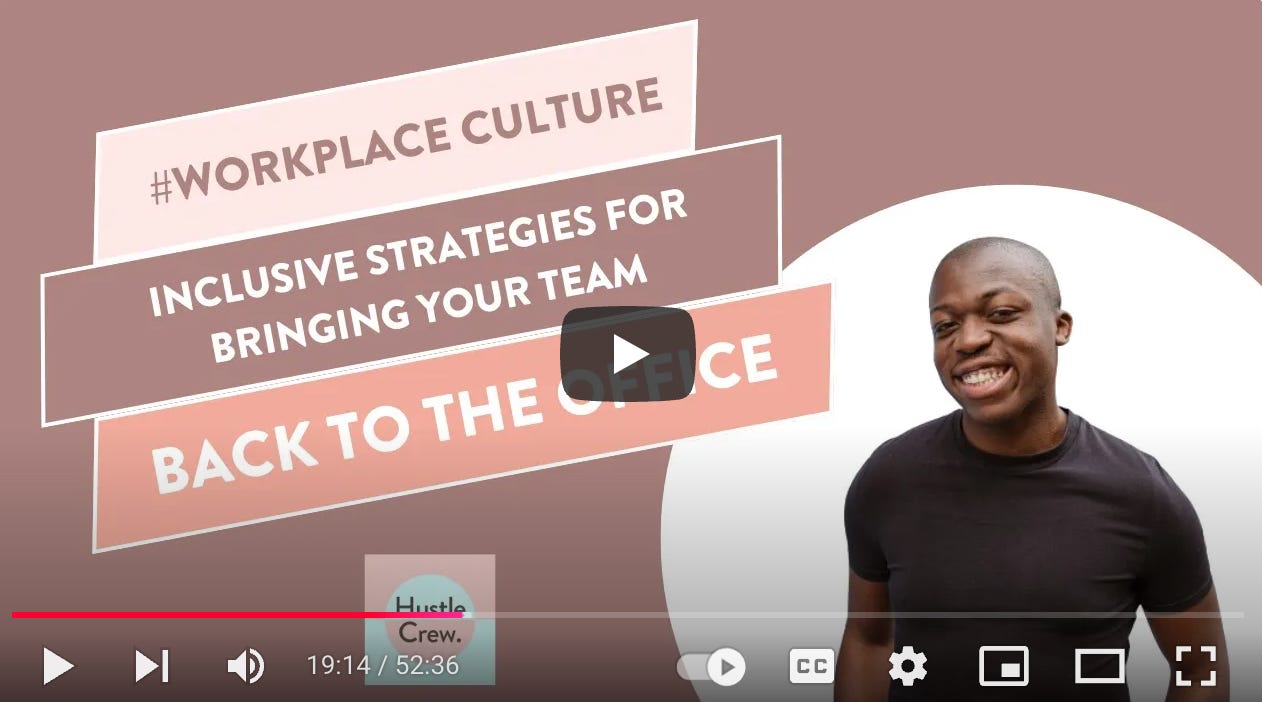How Return-To-Office Policies Make Workplaces "More White & More Male"
A guest post from People of Color in Tech
We’re trying something new with this edition, throwing the spotlight on leaders who inspire us in the way they challenge the status quo. Today’s spotlight is on People of Color in Tech, a leading global platform for the global majority in tech to share, grow, and get hired.
In this edition:
How the enforcement of in-office days is setting back progress on inclusion
If you like what you read, forward this to a friend. This post originally appeared on People of Color in Tech: subscribe to their newsletter here.
The push for full-time office work is gaining momentum at major companies, but experts warn it may come at a significant cost to workplace diversity.
Harvard Business School professor Prithwiraj Choudhury told Washington Post that these policies risk making workforces “more white and more male,” reducing organisational diversity and innovation.
Companies like Amazon, Goldman Sachs, and JPMorgan Chase have mandated employees to return to the office five days a week. Amazon, for example, enforced this policy in September 2024 after initially introducing a hybrid model last year.
While employers argue these mandates promote collaboration and corporate culture, they starkly contrast with the flexibility of pandemic-era remote work policies that employees widely embraced.
For underrepresented groups—such as women, caregivers, and people of color—rigid return-to-office (RTO) mandates create unique challenges, potentially undoing years of progress in building inclusive workplaces.
During the pandemic, remote work became a refuge for many marginalised groups.
A 2021 study revealed that 97% of Black knowledge workers were not ready to return to the office, citing freedom from workplace racism and politics as key benefits of working from home.
Since then, several studies have underscored the advantages of flexible work in attracting diverse talent. For example, a Wharton School study found that offering remote work options increased applications from women by 15% and from minorities by 33%.
A 2022 study in Time magazine found that 30% of white men wanted to return to a traditional office setting, in contrast to 22% of women (Black women included) wanting to return.
Meta also saw an unexpected increase in diverse hires in 2022 after expanding its remote working options.
The rollback of remote work is already affecting employee wellbeing.
Research from Johns Hopkins Carey Business School revealed a steep decline in workplace wellbeing among Black, young, and female employees in 2023 as in-office mandates returned.
Gartner’s 2023 survey also found that rigid RTO policies disproportionately drive high-performing employees, women, and millennials to quit, underscoring the risks companies face by not offering flexible arrangements.
For many workers, returning to the office presents logistical and emotional hurdles.
Former Amazon employees, for example, report being forced to relocate or leave due to rigid policies. Caregivers and those with neurodiverse needs cite significant challenges in adapting to these changes.
Experts warn that the true impact of such policies may unfold over time, with the loss of diverse candidates in hiring pools and eventual turnover among current employees.
Meanwhile, companies that maintain flexible work policies are better positioned to attract and retain diverse talent.
For guidance on inclusive ways to get your team spending more time working from the office check out our Hustle Crew webinar here.
Our Next Event
Join our free virtual workshop all about how to plan and reach your career goals. Listen as our founder & CEO Abadesi shares success strategies that have helped her pursue her ambitions in a male-dominated industry. You can register here: tell all the women you love to come along, too!
New Techish Podcast
This Tuesday catch an episode of Techish podcast as Abadesi and Michael dig into the hottest stories in tech and pop culture.
Free Resources
Want to get in touch?
Schedule a call with our founder & CEO Abadesi Osunsade here
Follow us on LinkedIn, Instagram, X (Twitter), YouTube
Thanks for reading all the way to the end, here’s something fun ICYMI: Our founder sat down with Notion Consultant and host of *the* podcast for London Business Babes, Frances Odera Matthews, check out the latest episode of 'Coffee and Oysters' now on Substack.






